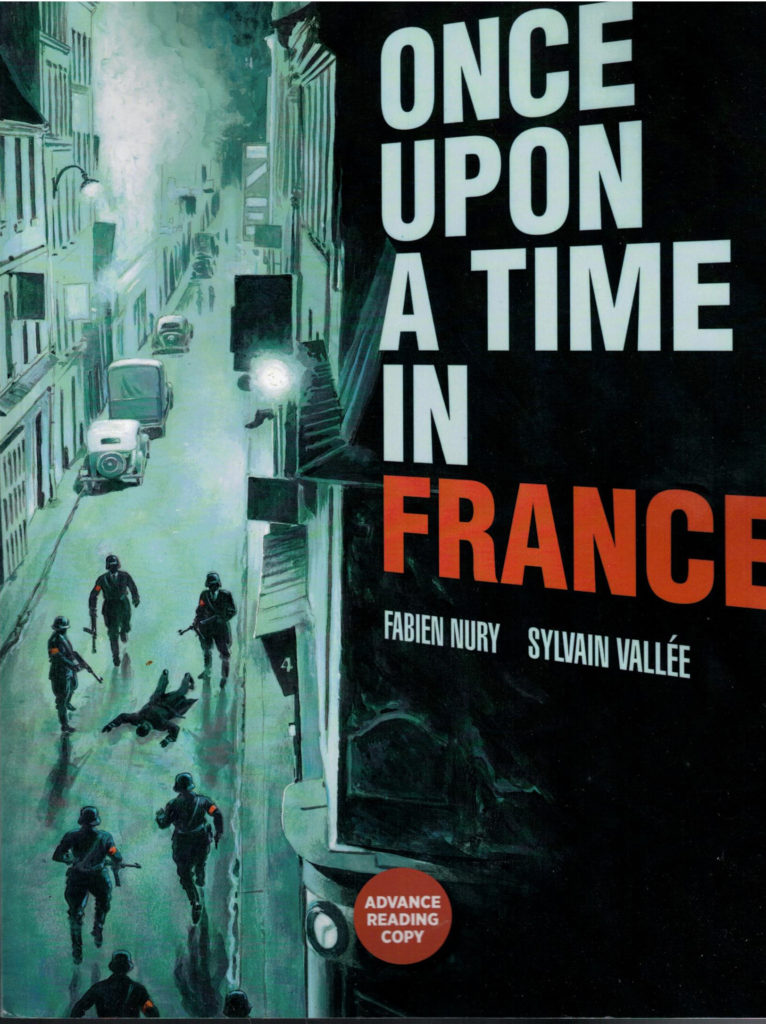Once Upon A Time in France by Fabien Nury, illustrated by Sylvain Vallee, Dead Reckoning Graphic Novels, © 2019, 360 pages, $29.95; scheduled for publication September 18, 2019.

 SAN DIEGO –In the view of the Gestapo stationed in Paris, Joseph Joanovici was a “useful Jew,” because as a scrap metal dealer he could obtain and sell to the Nazis materials needed for the war effort. At the same time, the French Resistance also thought he was useful because with the money he made as a Nazi collaborator, he was able to help the Resistance obtain weapons. Additionally, he was able to use his contacts within the Nazi hierarchy to free from prison his employees and his Resistance associates.
SAN DIEGO –In the view of the Gestapo stationed in Paris, Joseph Joanovici was a “useful Jew,” because as a scrap metal dealer he could obtain and sell to the Nazis materials needed for the war effort. At the same time, the French Resistance also thought he was useful because with the money he made as a Nazi collaborator, he was able to help the Resistance obtain weapons. Additionally, he was able to use his contacts within the Nazi hierarchy to free from prison his employees and his Resistance associates.
Playing both sides, Joanovici had friends among the Nazis and friends among the Resistance. He also had more than his share of enemies, who would be happy to kill him once he stopped being “useful.”
Although Joanovici had the connections to be able to flee Europe with his family, he stayed in Europe for the duration of World War II, playing his dangerous double game. To protect his wife and two daughters, he lived apart from them with his secretary – who loved him, but could never lure him to her amorous embrace, even after enemies killed Joanovici’s wife.
This graphic novel by Fabien Nury tells Joanavici’s story, with enough departures from the literal truth that it is described as a work of fiction rather than of fact. But the author and his illustrator associate Sylvain Vallee assure us that Once Upon A Time in France is closely based upon a truthful account.
The story does not end with the war because there were those in France who considered Joanavici’s collaboration with the Nazis to be traitorous, notwithstanding any good he might have done. Eventually, Joanavici was tried for economic crimes, but not for the murder of a young Resistance fighter—a murder which a obsessed prosecutor worked for years to prove Joanavici was the responsible party.
The art is carefully drawn, and as one reads through Nury’s captions to Vallee’s panels, one is tempted – however grudgingly – to admire Joanovici’s dogged determination and cleverness in the face of the ever-present likelihood of a firing squad.
Although he made fortunes, and had many admirers, Joanavici’s life was impoverished by his inability to fully trust anyone – not his wife, not his secretary, not his children. He died a very unhappy man.
*
Harrison is editor of San Diego Jewish World. He may be contacted via donald.harrison@sdjewishworld.com